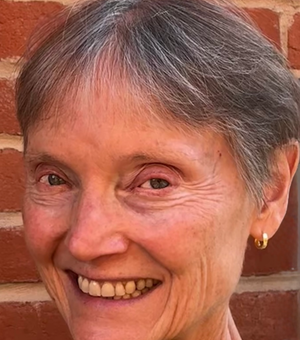Professor Charlotte Brewer
My research centres on lexicography, in particular the history of the Oxford English Dictionary (OED) from its beginnings in the late 1850s up to and including the major online revision currently underway at Oxford University Press. I am co-editing, with Stephen Turton (Gonville & Caius College, Cambridge), a selection of the vast correspondence of James Murray (1837-1915), the first chief editor of the OED, which played an essential role in the creation of this great dictionary. The first stage of our edition, which draws mainly on the Bodleian Library's collection of Murray's letters but also on a variety of other archives in the UK and further afield, was supported by the British Academy and Leverhulme Trust (https://www.murrayscriptorium.org).
I am also developing a new project on the relations between French and English dictionaries from Littré’s Dictionnaire de la Langue Française (1863–72) to the present day, beginning with the fruitful friendship between Murray and the French philologist Paul Meyer, whose help was invaluable to the OED.
My book on the history of the 20th-century OED, Treasure-House of the Language: the Living OED (Yale University Press), was published in 2007, and I’ve published many articles and book chapters before and since on OED’s coverage of individual authors and periods in the language (e.g. Shakespeare, Austen, the 18th century), its consequent influence on literary and linguistic history, and on English language dictionaries more widely. Some of my research can be seen on my website Examining the OED.
I began my research career as a medievalist, with publications on the late Middle English poem Piers Plowman and its textual and editing history, e.g. Piers Plowman: the Z Version (ed. with A. G. Rigg, Toronto, 1983) and Piers Plowman: the Evolution of the Poem (Cambridge University Press, 1996).
PILOT EDITION OF THE LETTERS OF JAMES MURRAY, co-edited with Stephen Turton
https://www.murrayscriptorium.org
RECENT BOOKS/EDITED COLLECTIONS
The Society's Dictionary: Articles and Excerpts on the OED. Virtual issue of The Transactions of the Philological Society, 2014
Traditions and Innovations in the Study of Middle English Literature: The Influence of Derek Brewer, ed. Charlotte Brewer and Barry Windeatt, Woodbridge, UK: Boydell and Brewer, 2013
Treasure-House of the Language: the Living OED, New Haven and London, Yale University Press, 2007
RECENT ARTICLES IN PEER-REVIEWED JOURNALS/CONTRIBUTIONS TO BOOKS
--‘Women in the OED’, in guest issue of History of Universities, ed. Elizabeth Baigent (forthcoming)
--‘Dictionaries from the eighteenth century onwards’, in Joan Beal and Raymond Hickey, eds., New Cambridge History of the English Language. Cambridge: Cambridge University Press (forthcoming)
--‘Ghosts of the past and the Oxford English Dictionary’, in Linda Pillière and Karine Bigand, eds., Ghosts, Memory and Identity. Routledge: London (2023)
--‘The future of Historical Dictionaries’, in Howard Jackson, ed., The Bloomsbury Companion to Lexicography. Bloomsbury: London (2022), pp. 375-387
--‘“Aggravated Mischief”: Editing and digitizing the papers of Sir James Murray’, Dictionaries: Journal of the Dictionary Society of North America, 42 (2021), pp. 259-280 (co-authored with Stephen Turton)
--‘When I feel inclined to read poetry I take down my Dictionary’, in Andrew Blades and Piers Pennington, ed., Poetry and the Dictionary (Liverpool University Press, 2020), 26-56
--‘The Lexicography of Standard Varieties of English’, in The Cambridge History of World Lexicography, ed. John Considine (Cambridge University Press: Cambridge, 2019), 484-508
--‘Setting a Standard: Authors and Sources in the OED’, in Linda Pillière et al, ed., Norms and Margins in English Usage (Cambridge University Press: Cambridge, 2018), 127-143
--‘Shakespeare and the OED’, in The Cambridge Guide to the Worlds of Shakespeare, ed. Bruce Smith et al (Cambridge University Press: Cambridge, 2016) vol 1, 240-45
--‘Monarchs and minnows vs broadband and bungee jumping: “language as it is used” in children’s English language dictionaries’. English Today 32 (2016), 31-37.
--"'That reliance on the ordinary': Jane Austen and the Oxford English Dictionary", in Review of English Studies 66 (2015), 744-65. Selected as Editors' choice for free online access and available here
--'Metalanguage and Labelling in English Dictionaries', in The Oxford Handbook of Lexicography, ed. Philip Durkin, Oxford University Press, 2015, chapter 30, 488-500
--‘Shakespeare and the OED’, forthcoming in the Cambridge World Shakespeare Encyclopedia, ed. Bruce Smith et al
--‘OED Online Re-launched: Distinguishing old scholarship from new’, Dictionaries 34 (2014), 101-26
--'The future of historical dictionaries', in The Bloomsbury Companion to Lexicography, ed. Howard Jackson, Bloomsbury, London, 2013, 341-54
--'Words and Dictionaries: OED, MED and Chaucer', in Traditions and Innovations in the Study of Middle English Literature: The Influence of Derek Brewer, ed. Charlotte Brewer and Barry Windeatt, D. S. Brewer (2013), 215-61
--‘Shakespeare, word-coining, and the OED’, Shakespeare Survey Volume 65 (2013), 345-57
--‘“Goose-quill or Gander’s”? Female writers in Johnson’s Dictionary’, in Samuel Johnson: The Arc of the Pendulum, ed. Freya Johnston and Lynda Mugglestone, Oxford University Press (2012), 120-139
--‘Dictionary-making, usage, literature and the classics: the unhappy fate of Oxford’s Quarto dictionary 1925-1958’, in Codification, canons, and curricula, ed Ulrich Busse, Ralf Schneider, and Anne Schröder, Aisthesis Verlag, Bielefeld, 2012, 167-82
--'"Happy Copiousness"? OED's recording of the language of female authors of the eighteenth century', Review of English Studies (2012), 86-117. Available on Oxford Journals site here
--'Prescriptivism and descriptivism in the first, second and third editions of OED', English Today 26 (2010): 24-33
--'The Use of Literary Quotations in the OED’, Review of English Studies 61 (2010), 93-125. Available on Oxford Journals site here
--‘The OED as “literary instrument”: its treatment past and present of the vocabulary of Virginia Woolf’, Notes & Queries (2009) 56, 430-44. Available on Oxford Journals site here




